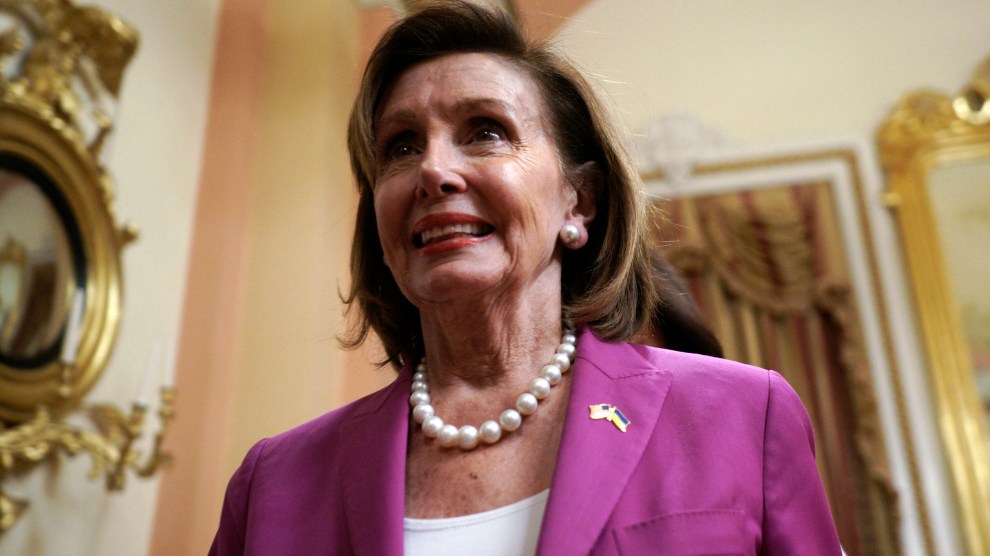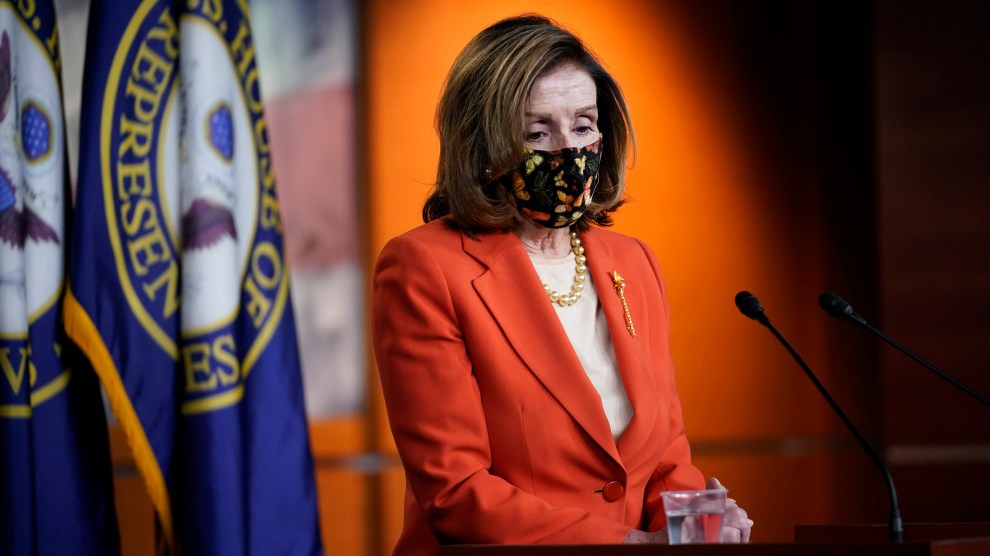
Mother Jones illustration; Tayfun Coskun/Anadolu/Getty
In the month that followed President Joe Biden’s disastrous debate with Donald Trump, it has sometimes been hard to escape the conclusion that, for all the warnings that the Republican candidate was an existential threat to democratic governance who must be defeated in November, many of the people tasked with stopping him really didn’t seem to feel that way. You did not expect much different from Rep. Jared Golden, a Blue Dog co-chair who represents a Trump-leaning Maine district. But the lack of real fear or urgency was the unspoken, or sometimes spoken, subtext of so many stories. The sorts of ambitious Democrats who might, all things being equal, want to nudge Biden and challenge Trump themselves, were waiting until 2028. Someone described as a “senior House Democrat” told Axios, “We’ve all resigned ourselves to a second Trump presidency.” If there was one Biden comment that stung more than all the others, it was his response to a question from George Stephanopolous during his first post-debate interview about how he’d feel in January if Trump went on to win.
“I’ll feel as long as I gave it my all and I did as good a job as I know I can do,” Biden said, “that’s what this is about.”
But not everyone was as resigned to a Democratic loss as that senior House Democrat. While Biden’s stubbornness exacerbated liberal frustrations with the party’s gerontocracy, one of the most persistent and influential voices in persuading him to pass the torch turned out to be a Democrat who had already done so—the 84-year-old former Speaker of the House Nancy Pelosi. A Politico story on Monday offered details on the San Francisco congresswoman’s pressure campaign, which she was reportedly prepared to escalate:
Senior Biden aides were bracing for former House Speaker Nancy Pelosi (D-Calif.), who’d worked behind the scenes to encourage others in the party toward the kind of collective action that might finally push the president to end his campaign, to go public this week and possibly even disclose Democratic polling clarifying Biden’s dire political straits.
“Nancy made clear that they could do this the easy way or the hard way,” said one Democrat familiar with private conversations who was granted anonymity to speak candidly. “She gave them three weeks of the easy way. It was about to be the hard way.”
Pelosi’s efforts to marshal support within her caucus for a new candidate is a remarkable and fitting capstone to a career that has been spent doing some variation of what she did these last few weeks: assembling just enough of a quorum to move the party’s agenda forward.
The former speaker’s skill as a herder of cats is easiest to appreciate if you simply look at the opposition. It has been 21 years since she first became the figurehead for Democrats in the House. (She is now merely an extremely influential emerita.) In that period, Republicans have gone from Dennis Hastert to John Boehner and Eric Cantor, to Paul Ryan, to Kevin McCarthy, to Mike Johnson. I can think of three extended periods in which the caucus was struggling to decide on anyone at all. Because of the intransigent House Freedom Caucus, House Republican leadership has been largely unable to function for about a decade. Anyone who has ever watched a Republican general-election campaign ad understands that Pelosi’s longevity could be a liability too. But that was sort of the deal you got: It is hard to keep a caucus together, and no one in American politics was better at it.
Pelosi’s closest parallel is Mitch McConnell (R-Ky.), who first took over the Senate Republican conference in 2007, the same year Pelosi first became speaker. But where McConnell could never bring himself to meaningfully rebuke Trump—not even when the ex-president was at his political low point, following January 6—Pelosi ultimately chose to use what leverage she had to drive Biden from the race.
That Pelosi picked this fight with Biden is a testament to the fact that even on her way into the sunset, she’s still got it. But it’s also a recognition of how many legacies are at stake. Democrats spent more than a decade digging out from the wreckage of 2010. You don’t just move on from an electoral wipeout, and Pelosi’s legacy is on the line this fall too. Trump has promised to revisit the Affordable Care Act, which he was one Senate vote away from repealing in 2017. He wants to roll back the Inflation Reduction Act, which included landmark investments in climate adaptation and green energy. (Trump is particularly upset about the law’s electric-vehicle mandate.) Roe is already gone. Republicans are coming for the civil service and the administrative state. Obergefell could be on the chopping block. He is poised, in other words, to turn the Obama and Biden eras into historical footnotes and render much of Pelosi’s life’s work obsolete.
Faced with that choice, Pelosi chose to go down fighting for her legacy. And by bowing out to a younger and healthier next-in-line, Biden did too.

















